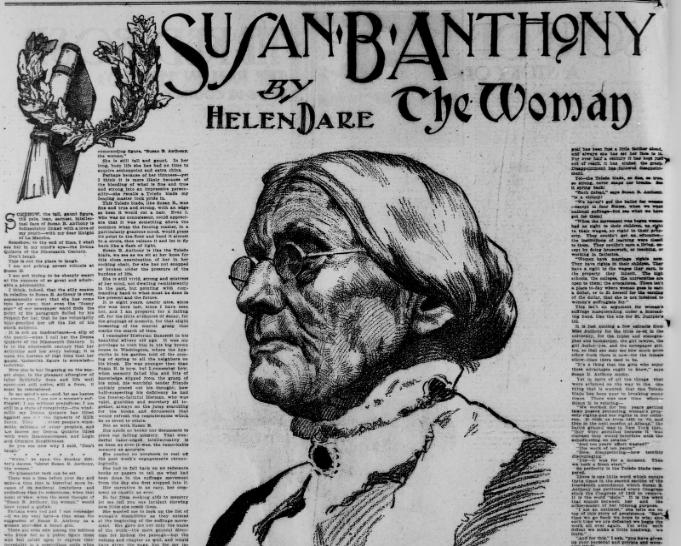|
Moderated by NW Okie! |
Volume 14 , Issue 212012Weekly eZine: (374 subscribers)Subscribe | Unsubscribe Using Desktop... |
Susan B. Anthony, The Woman

Why did Susan B. Anthony take up the cause of "Woman's Suffrage?" Why did she give her private, personal women's life to it? Susan B. Anthony was interviewed by Helen Dare for an article on, Susan B. Anthony, The Woman, that appeared in San Francisco Call, 30 July 1905, when Anthony was turning 85 years of age.
Here, in a paragraph or two, is the whole story of Susan B. Anthony, Suffragist. Once having set her foot on the road that seemed the right road to her there has been no turning back. Always the goal has been just a little farther ahead, and always she has set her face to it. For over half a century it has kept just out of reach, it has eluded the grasp. Disappointment has folioed disappointment. Yet, the Toledo blade, so fine, so true, so strong, never snaps nor breaks. Each defeat to Susan B Anthony was a victory!
Susan B. Anthony responded in The San Francisco Call, 30 July 1905, "I had taught school for fifteen years, from the time I was fifteen until I was thirty. I got a dollar and a half a week, six dollars a month, for the same work that a man got thirty for, just because he was a man. I taught during the summer term, giving my place up to a man during the winter term, because at theta time a woman was not considered capable of going through the snow, and keeping the fire in the school going, as a man -- and the children who attended the school -- had to do."
"The man who filled my place during the winter term was staying at our house. Somebody asked him how he was getting along with the school.
"'Oh,' said he, "I ain't looked the barn over yet. I'll know better when I look it over!"
"This was the answer of the man who took my place, and who was paid $30 a month against my $6. Naturally I gave it some thought. I wondered why it was that he should have the advantage."
Anthony also stated, "Just about this time Lucretia Mott and Elizabeth Cady Stanton came to our town to speak on Woman's rights. I was told about Lucretia Mott and her pretty Quaker kerchief and sweet face, and about Mrs. Stanton and her black curls and fresh color and ready wit, and urged to go to hear them. I laughed at the idea. But I did go to hear them, and I did come to understand why the man who was not so competent as I was got my place and $30 a month to my $6."
Anthony said the upshot of it was that she saw the importance of the ballot to women., and she started out to do what she could to get it for them. She gave up teaching in 1859, and she had been working for this one thing ever since.
When the suffrage movement was begun women had no right to their children, no right to their wages, no right to their property. They could not get an education because the institutions of learning were closed to them. They could not earn a living, except by doing housework, or teaching, or working in factories.
Back in 1905, Women had marriage rights. They had rights in their children. They had a right tot he wages they earned, to the property they inherited. The high schools, the colleges, the universities were open to them; the avocations. There was not a place back then where woman went to earn a dollar, or to fit herself for the earning of the dollar, that she was not indebted to woman's suffragists.
There was one time when Susan B. Anthony related, "We worked for ten years getting laws passed protecting woman's property rights and her rights in her children. It took us from 1851 to 1861, and then in the next session at Albany, they were annulled because it was claimed they would interfere with the adjudicating on estates. And ten years effort wasted."
There was one little word which occurs three times in the second section of the fourteenth amendment which Susan B. Anthony has petitioned every Congress since the Congress of 1865 to remove. It is the word "male." It is this word that stood between her and the achievement of her lifelong purpose.
| View or Add Comments (0 Comments)
| Receive
updates ( subscribers) |
Unsubscribe
| © . Linda Mcgill Wagner - began © 1999 Contact Me | |
